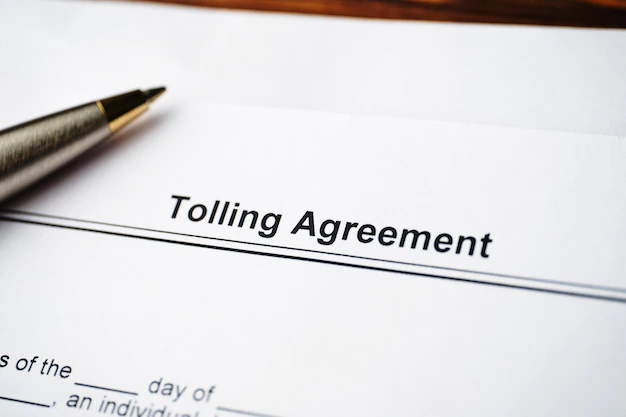When a possible plaintiff and potential defendant reach a formal agreement to prolong the statutory limitations period, this is referred to as a tolling agreement.

Tolling agreements are formal agreements between a possible plaintiff and a potential defendant to prolong the statutory limits time period on the plaintiff’s claim, often so that parties have more time to resolve their disagreement without going to court. A tolling agreement, by definition, analyses the existing or future prospect of contesting a claim. Tolling agreements often relate to present or prospective claims that are going to court.
Table of Contents
What Is the Function of a Tolling Agreement?
A tolling arrangement is used to prevent losing a right owing to a statute of limitations. The parameters of the agreement may be negotiated by the parties concerned, usually via their lawyers. Finally, the parties to the agreement agree to waive the statute of limitations until a defined condition or time period is met.
As a result, if a party demands that you sign a tolling agreement, tell your insurance carrier as soon as possible, even if no actual claim has been made. If you fail to disclose the issue, you may jeopardise your coverage for both a specific claim and any claims originating from your earlier actions.
Prior knowledge provisions are included in the majority of professional liability policies, such as those produced by underwriters for the ASCE programme. These provisions restrict the qualifying coverage provided in the insurance agreement to claims originating from actions, omissions, or mistakes that the insured party was unaware of or could not have reasonably anticipated to result in a claim prior to the effective start date of coverage. Simply stated, if you are aware that certain activities, omissions, or mistakes may give rise to a claim before to the effective state date of coverage, there will be no coverage for any subsequent claim arising from these acts, omissions, or errors.
As a result, if you were requested to sign a tolling agreement, you will be presumed to have been aware of any conduct, omissions, or mistakes that might give rise to a claim. In other words, if you are requested to sign a tolling agreement prior to the coverage period in which the related claim is first filed and do not disclose it to your insurance provider, you will not be covered for the claim.
The Advantages of Tolling Agreements
If you report the scenario, your insurance provider may be able to help you in navigating the problem in a manner that prevents litigation or, at the very least, puts you in the best position to defend yourself should any future lawsuit emerge.
The prospective litigant certainly profits from a tolling arrangement. In most cases, a personal injury tort suit, debt collection, or breach of contract claim would be barred by the statute of limitations. Often, the plaintiff has enough information to fulfil the fundamental standards for pleading their case before the litigation may proceed, but pulling the components together before the statute of limitations expires might be a race against time. By extending the time for filing a claim, the plaintiff retains the right to sue when the right would have been lost otherwise.
It may not be obvious why a prospective defendant would desire to engage into a tolling arrangement, but there may be significant advantages for the defendant as well. Tolling agreements may emerge over the course of settlement talks. If the defendant has always determined that they would prefer settle than defend against lawsuit, they may be ready to extend the statute of limitations period to allow for the completion of discussions. If not, the plaintiff may have to launch a lawsuit solely to protect their rights.
A tolling agreement may also create a win-win scenario by ensuring clarity regarding when an action can be brought. Even with the statute of limitations, the timing for a plaintiff’s right to suit may be confusing for a variety of reasons.
Creating a tolling agreement allows both parties to redefine the statute of limitations period, with an extension of time granted in return for an agreement not to suit after a specified condition or date. With such assurance, both sides will be able to more readily evaluate their positions and engage in meaningful talks.